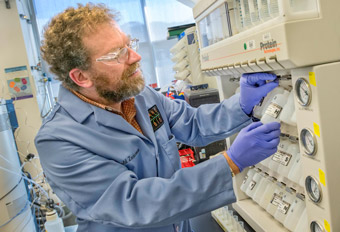
Biological Nanostructures Facility Director, Ron Zuckermann, and his team of researchers are designing two-dimensional peptoid nanosheets — a material made of biomimetic polymers, two molecules thick — that could one day be used to make sensors that detect lethal chemical agents or deadly viruses deployed during warfare or a terrorist attack.
For the past six years, Zuckermann has been funded by the Defense Threat Reduction Agency (DTRA) of the Department of Defense (DOD) to design synthetic proteins that do all the things a natural antibody protein can do — self-assemble into a precise structure that recognizes viruses and bacteria — but are more durable than natural molecules and can be stored without refrigeration. Self-assembling biomimetic nanostructures (or nanostructures designed to mimic nature) are also highly sought by the military and industry alike for their potential to rapidly make large quantities of affordable yet more rugged materials.

